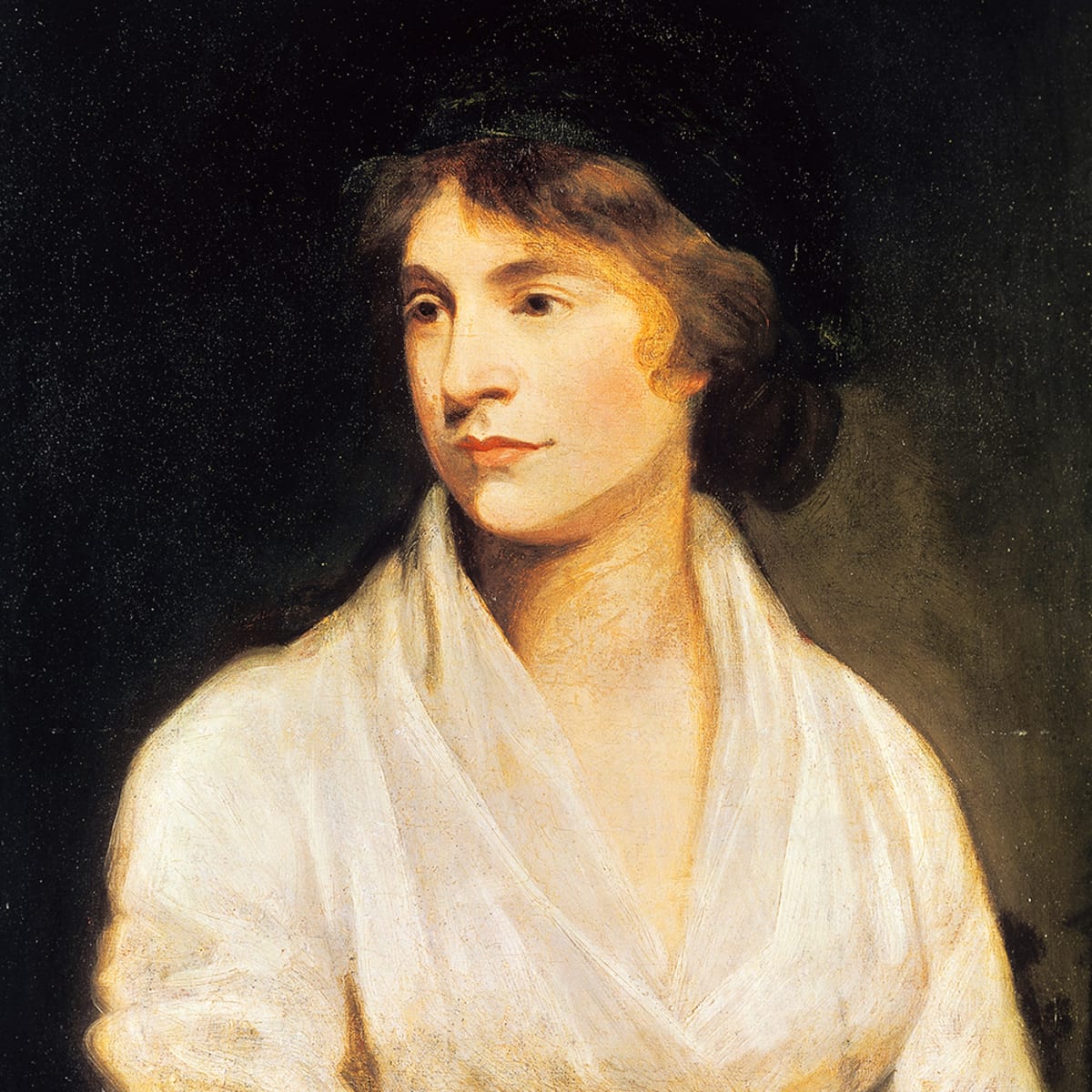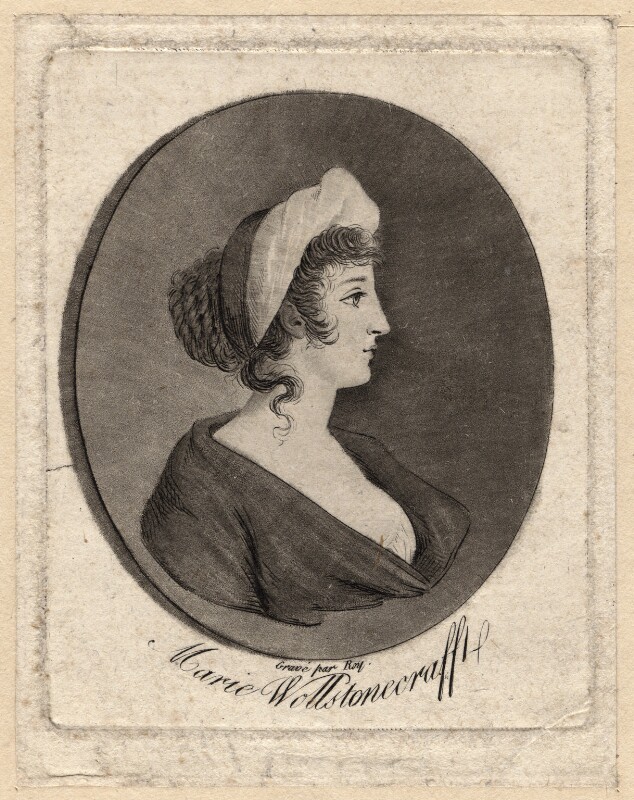“I do not wish women to have power over men; but over themselves.”
Yes, Queen.

Mary Wollstonecraft was born on April 27th, 1759, in London. Though later on in her life she would be known for her writings and her advocacy of the social and educational equality of women, she was born somewhat inconsequentially as the second of seven children. Mary grew up in a household with a violent alcoholic father who squandered away all their savings and inheritance before Mary could come of age. She worked as a governess and a lady’s companion in her young life, both of which were formative influences on her views of the role of women in society. Mary also had two significantly influential friendships as a young woman – with Jane Arden and Fanny (Frances) Blood. Arden’s philosophical and academic family greatly impacted Wollstonecraft’s ability to think outside-the-box (so to speak), and her friendship with Fanny gave her purpose and female companionship. As a matter of fact, at one point Mary, her sister Eliza and Fanny opened up a school for girls in Newington Green. Her experiences in the education of young women (and subsequent job as a governess) gave her her greatest ideas on the education of women and how it affects their future in society.
“If women be educated for dependence; that is, to act according to the will of another fallible being, and submit, right or wrong, to power, where are we to stop?”
Unfortunately, Mary’s closest friend Fanny died relatively young, after becoming pregnant while suffering from a weak constitution. A heartbroken Mary used her connections to become a governess to a family of girls in Ireland, and although the girls found her an inspiring instructor, a frustrated Mary decided to give up the position to pursue writing and publishing full-time (a radical notion for a woman, in 1787). In 1788 she began working as a translator for a London publisher, Joseph Johnson, whom she regarded as a father/brother figure, and whom she remained quite close to for the rest of her life. During her first stint working for Johnson she wrote several reviews for his Analytical Review publication, all the while expanding her mind through translating texts and writing her own. Mary seemed happy in London – constantly meeting intellectuals, activists and other interesting figures at meetings and dinners at Johnson’s. Some of these influential individuals included Thomas Paine and William Godwin (the scholar considered the father of modern anarchism – though Mary and Godwin did not originally hit it off). Mary’s free-thinking ways led her to propose to live platonically with a married man she was enamored with (artist Henry Fuseli) and his wife – the astonishment of society at such an idea leading her to decide to move abroad. Well… that and her obvious interest in the French Revolution, as was evidenced in one of her most famous works, A Vindication of the Rights of Woman, published in London in 1790 as a response to Whig MP Edmund Burke’s conservative critique of the events in France. Her publication shot her to activist stardom seemingly overnight (though at the very first it was published anonymously – the second edition published a month after the first pronounced her as the author). Wollstonecraft left for Paris, to witness the Revolution firsthand.
“It is vain to expect virtue from women till they are in some degree independent of men.”
 During her time in France, Mary witnessed the execution of King Louis XIV, even saw some of her friends executed when the Jacobins took power, was refused her requests to leave the country, and lived with American adventurer Gilbert Imlay, with whom she had a passionate affair. (“Which of these things is not like the other?”, you may as well ask!) Though all of her experiences greatly influenced her thoughts and views of humanity, she decided to put her individuality and power to the test by living unmarried with a man, and bearing a child by him, named Fanny after her dearest deceased friend. Wollstonecraft and Imlay remained together long enough to do a bit of traveling, and for Mary to publish two other works – An Historical and Moral View of the Origin and Progress of the French Revolution, and a introspective and personal travelogue, Letters Written During a Short Residence in Sweden, Norway and Denmark. After Imlay left her, Wollstonecraft returned to England to pursue him, and after bouts of suicidal tendencies and depression fell back into Joseph Johnson’s literary circle. Eventually, Mary began striking up a friendship, and then a passionate love affair with William Godwin. Of her work (her travel Letters, in particular) Godwin wrote, “If ever there was a book calculated to make a man in love with its author, this appears to me to be the book. She speaks of her sorrows, in a way that fills us with melancholy, and dissolves us in tenderness, at the same time that she displays a genius which commands all our admiration.” Despite not being proponents of marriage in general, the two wed shortly before Wollstonecraft’s second child was born – her daughter Mary, who would later go on to write Frankenstein as Mary Shelley (to read our blog on the second brilliant female mind in the family, click here). Eleven days after the birth of her second daughter, Mary Wollstonecraft Godwin (as she was then known) passed away due to complications from the birth.
During her time in France, Mary witnessed the execution of King Louis XIV, even saw some of her friends executed when the Jacobins took power, was refused her requests to leave the country, and lived with American adventurer Gilbert Imlay, with whom she had a passionate affair. (“Which of these things is not like the other?”, you may as well ask!) Though all of her experiences greatly influenced her thoughts and views of humanity, she decided to put her individuality and power to the test by living unmarried with a man, and bearing a child by him, named Fanny after her dearest deceased friend. Wollstonecraft and Imlay remained together long enough to do a bit of traveling, and for Mary to publish two other works – An Historical and Moral View of the Origin and Progress of the French Revolution, and a introspective and personal travelogue, Letters Written During a Short Residence in Sweden, Norway and Denmark. After Imlay left her, Wollstonecraft returned to England to pursue him, and after bouts of suicidal tendencies and depression fell back into Joseph Johnson’s literary circle. Eventually, Mary began striking up a friendship, and then a passionate love affair with William Godwin. Of her work (her travel Letters, in particular) Godwin wrote, “If ever there was a book calculated to make a man in love with its author, this appears to me to be the book. She speaks of her sorrows, in a way that fills us with melancholy, and dissolves us in tenderness, at the same time that she displays a genius which commands all our admiration.” Despite not being proponents of marriage in general, the two wed shortly before Wollstonecraft’s second child was born – her daughter Mary, who would later go on to write Frankenstein as Mary Shelley (to read our blog on the second brilliant female mind in the family, click here). Eleven days after the birth of her second daughter, Mary Wollstonecraft Godwin (as she was then known) passed away due to complications from the birth.
“It appears to me impossible that I should cease to exist, or that this active, restless spirit, equally alive to joy and sorrow, should be only organized dust—ready to fly abroad the moment the spring snaps, or the spark goes out, which kept it together. Surely something resides in this heart that is not perishable—and life is more than a dream.”
Wollstonecraft died much too young – and one might now argue that the world as she knew it was too little, too conservative for her rather modern notions. Nevertheless, her legacy lived on – not only did she propose radical notions of educational equality and female power, but she ran in circles that picked up her theories and helped spread the word. Her legacy also lived on in her children, particularly in Mary Shelley – who supported similar ideas of female empowerment and sexual freedom. To this day, the name Mary Wollstonecraft is a household name symbolical of female rights and equality, as she was the epitome of a free-thinker! Happy Birthday to Mary Wollstonecraft!

